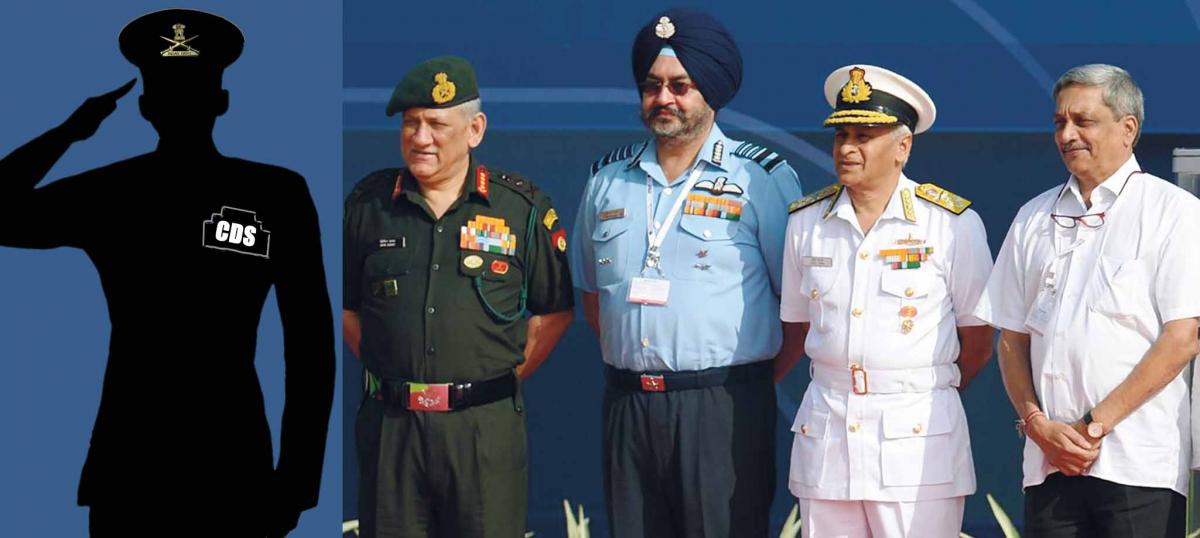 The Government of India is trying to expedite the process of recruiting its first Chief of Defence Staff. According to government sources, a note has been sent to the Defence Committee by the Indian Defence Ministry. Prime Minister Narendra Modi will have a meeting with the Defence Minister Manohar Parrikar and the National Security Advisor Ajit Doval regarding the note to take a final call on the issue.
The Government of India is trying to expedite the process of recruiting its first Chief of Defence Staff. According to government sources, a note has been sent to the Defence Committee by the Indian Defence Ministry. Prime Minister Narendra Modi will have a meeting with the Defence Minister Manohar Parrikar and the National Security Advisor Ajit Doval regarding the note to take a final call on the issue.
According to Defence Department insiders, this step is being taken to optimise resource utilisation among the three armed services. A single point military adviser to the political leadership will aid in matters of acquisition, procurement policy, and resource rationalisation. “The new post of the CDS will not be used as parking slots for super-ceded generals and a new man will be tasked with the job once the work profile is clearly defined,” said a senior official.
Defence Minister Parrikar is currently studying the report submitted by retired General D.B. Shekatkar on making the military more effective with better teeth-to-tail ratio. The Shekatkar Committee has also identified areas where there is redundancy and downsizing of the military could be undertaken without compromising combat effectiveness.
Who is a chief of defence staff?
Parrikar had set up a committee to work on enhancement of combat capabilities of the Indian armed forces. According to Parrikar, “There is need for integration of forces at two levels. One within the three services and the other with the Ministry of Defence. CDS should not be symbolic and the integration should not be cosmetic.” The CDS will be a single-point military advisor to the defence minister on military matters. He should have authority over the three chiefs but the chiefs would remain responsible for the functioning of their forces. Keeping in mind future warfare enhancement of combat capabilities, formation of a cyber space command and a Special Forces command are included in the plan.
Rank of the CDS
The government seems to have refrained from giving a proper rank to the CDS. It seems that the Indian Cabinet has been subjected to civilian bureaucratic pressure. There is no justifiable reason why the CDS should not be of five-star rank. Also as pointed out earlier, the work ethics of the Indian armed forces does not admit the Western principle of ‘first amongst equals’.
How will the CDS be selected?
Given the present structure and size of each of the services, predominance of land-based threats and internal security threats dictate that the CDS, for some time, should be from the Indian Army. The CDS should be the “brightest spark” in the Indian Armed Forces. Hence seniority should not be the criteria for selection. Qualities of comprehensive intellectual brilliance, imaginative strategic vision and innovation should be the determining criteria. Audacity in vision would be an important criterion. Selection of the CDS should be from two panels of three names each. One panel should be made by the Union ministers on the defence committee and the other panel should be proposed by the incumbent CDS. The civil bureaucracy should not be associated with the selection of the CDS.
Conclusion
The decision to appoint a CDS, despite bureaucratic opposition is a bold and innovative step taken by the present government. The government should not allow appointment of the CDS to be mired in any controversy. Initial organisation set-ups and links should be termed and viewed as experimental and be reviewed every three years until the ideal system relevant for Indian strategic interests emerges.
ROLE OF THE CHIEF OF DEFENCE STAFF
While many models of the role of CDS exist in Western democracies, India’s strategic
environment and requirements are different.While these models can serve as guidelines, the government has to bear in mind the following determinants of the role of India’s CDS:
l Strategic and defence expertise still remains exclusively in the domain of the uniformed fraternity, despite the growing emergence of civilian experts in the academic field.
l India’s borders and threats are predominantly land-based. Despite technological advances, India’s defence requirements would be mostly based on the extensive man-power of the Land Army.
l The Indian working ethos is hierarchy-based. It does not admit the Western concept of ‘first amongst equals’.
l India’s strategic weaknesses that have emerged in the wars since 1947 are centred on the lack of war preparedness, poor intelligence and slow processing of defence requirements.
l Internal security threats are fast overtaking threats form external armed aggression. These entail extensive use of the Indian Army during peace in internal security operations.
Add new comment